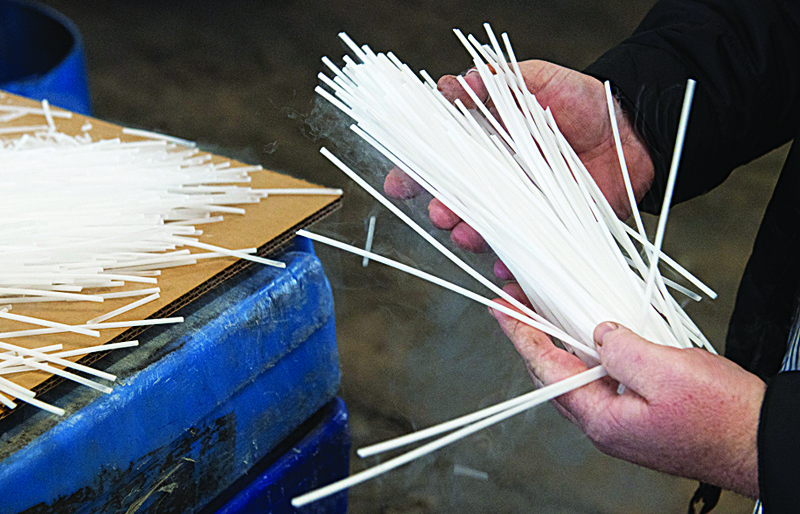 BALTIMORE: In this file photo, an employee holds pieces of dry ice at Capitol Carbonic, a dry ice factory, in Baltimore, Maryland. - AFP
BALTIMORE: In this file photo, an employee holds pieces of dry ice at Capitol Carbonic, a dry ice factory, in Baltimore, Maryland. - AFP
WASHINGTON: US factory activity slowed sharply in July amid ongoing supply shortages and bottlenecks, according to an industry survey released yesterday. While manufacturing continues to grow, the reopening of the economy has hit speed bumps that have posed challenges to industry, including rising material prices and difficulties in hiring workers, according to the Institute for Supply Management's (ISM) monthly report.
Its manufacturing index fell 1.1 points to 59.5 percent, the lowest level since January, although that remains above the 50-percent threshold indicating growth. Companies "continue to struggle to respond to strong demand due to difficulties in hiring and retaining" workers, ISM survey chief Timothy Fiore said. He noted that "all segments of the manufacturing economy are impacted by near record-long raw-material lead times, continued shortages of critical basic materials, rising commodities prices and difficulties in transporting products."
The indexes for new orders, production and deliveries all fell, while the order backlog measure increased slightly, the report said. However, the employment index jumped three percentage points and prices fell 6.4 points, indicating a slight improvement in the factors holding back manufacturing.
"Labor challenges across the entire value chain and transportation inefficiencies are the major obstacles to increasing growth," Fiore said. Oren Klachkin of Oxford Economics said the survey indicates growth in the sector likely has peaked. "The manufacturing outlook remains quite bright, with hearty goods demand, rising business investment and firming global activity set to keep factories churning at a solid pace," he said. "But manufacturers will have a tough time meeting robust demand."
Meanwhile, stock markets rebounded yesterday but investor optimism over the global recovery was kept in check by worries over the spread of coronavirus variants as well as China's regulatory crackdown. Signs that US lawmakers were edging towards agreement on President Joe Biden's $1 trillion infrastructure bill were unable to provide much of a boost, while eyes were on the release of US jobs data at the end of the week as firms struggle to fill positions.
The Dow Jones index was stronger as trading got underway in New York. On the corporate front, shares in Sydney-listed Afterpay surged by nearly 19 percent after US digital payments platform Square, led by Twitter founder Jack Dorsey, said it would purchase the buy-now, pay-later company for $29 billion. In the latest sign of an upbeat global outlook, figures last week showed the US economy had returned to its pre-pandemic level-though at a slower pace than expected-while the eurozone expanded at a much better rate than forecast.
However, observers said the rally that world markets have enjoyed for much of the past year was sputtering as investors grow increasingly concerned about spiking inflation that many have warned could force central banks to taper their ultra-loose monetary policies.
Added to that are the slow COVID-19 vaccination programs in some countries and the rapid spread of the Delta variant that has led to the reimposition of lockdowns and other containment measures. Among those suffering a spike in cases is economic powerhouse China, where the disease was largely under control but now some cities are being forced to introduce new control measures. "Shares remain at risk of a short-term correction or volatility as coronavirus cases rise globally, the inflation scare continues and as we come into seasonally weaker months," said Shane Oliver at AMP Capital.
"But surging company profits in the US and lower bond yields are providing support." Nervous traders are keeping tabs on China also after authorities there last week embarked on a crackdown on the country's private tuition firms as well as the tech and property sectors. The moves raised concern that other industries could be next, despite officials and state media trying to calm markets in the face of a rout. - AFP




